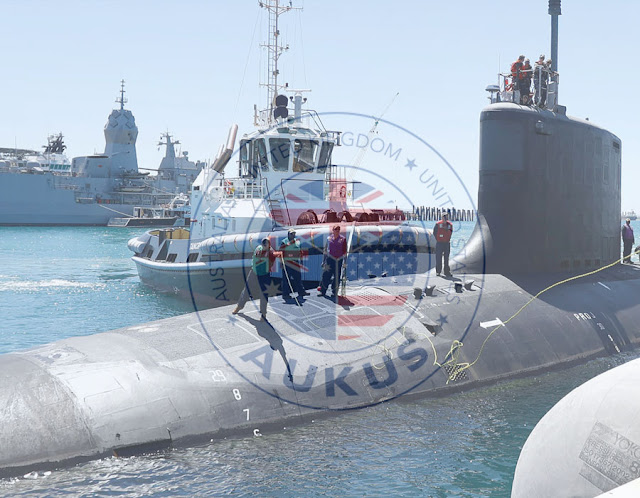The US has launched a review of the AUKUS submarine deal with Australia and the UK, aiming to align it with President Trump's 'America First' defense strategy.
 |
| Amid rising defense pressure on allies, the US is reviewing the AUKUS submarine pact to align with national interests, raising new questions over its future. Image: ASA/ AUKUS |
Washington, United States — June 12, 2025:
The United States has initiated a strategic review of the AUKUS submarine deal with the United Kingdom and Australia, casting uncertainty over the future of the landmark trilateral defense pact. The review is being undertaken to ensure the agreement fits the Trump administration’s ‘America First’ priorities, particularly in regard to resource allocation, military readiness, and allied burden-sharing.
Signed in 2021, the AUKUS agreement is a multi-billion dollar initiative that aims to bolster Australia’s military capabilities with nuclear-powered submarines and advanced defense technologies, provided primarily by the US and UK. The deal, worth approximately $239 billion, was designed to strengthen deterrence in the Indo-Pacific amid growing Chinese influence. However, officials in Washington now say a reassessment is essential to align with current defense priorities.
A US defense official told the BBC the review “is part of ensuring that this initiative of the previous administration is aligned with the President’s America First agenda.” Defense Secretary Pete Hegseth emphasized that this means ensuring the highest readiness for American forces and demanding greater defense contributions from allies.
Australia and the UK have responded cautiously. Australian Defence Minister Richard Marles expressed optimism, saying, “I'm very confident this is going to happen. Australia absolutely needs a long-range submarine capability.” He noted that Canberra must stay committed to the strategy, particularly after its controversial decision to cancel a prior submarine deal with France in favor of AUKUS.
The review will be led by Elbridge Colby, a former Pentagon official who has criticized the agreement, questioning the wisdom of sharing elite nuclear technology when American submarine production is already under strain. “Why give away the crown jewels when we most need them?” Colby said in a previous speech.
The Trump administration is pressing allies to raise defense spending, setting a target of 3% of GDP. While the UK has committed to meeting this goal by the next parliamentary term, Australia’s increase falls short of expectations. Analysts suggest Washington’s concerns may also include whether Australia would deploy the submarines in alignment with US strategic aims, especially in a potential conflict involving Taiwan.
From 2027, US and UK submarines are scheduled to rotate through Perth, Western Australia, and Canberra will begin acquiring three second-hand Virginia-class submarines in the early 2030s. A new class of nuclear-powered attack submarines—jointly designed by the UK and built in both Britain and Australia—will follow.
Jennifer Kavanagh of the US think tank Defense Priorities said the review was “absolutely right,” warning the US might struggle to meet its own submarine demand. She added the agreement could be refocused on other long-range weapon technologies if submarine delivery proves too ambitious.
China, a vocal critic of the AUKUS pact, would likely view any weakening of the agreement as a geopolitical win. Despite this, both the UK and Australian governments stress that AUKUS remains a cornerstone of security cooperation in the Indo-Pacific and Euro-Atlantic regions.
An Australian government spokesperson said it was “natural” for a new US administration to examine inherited agreements. “There is clear and consistent bipartisan support for the deal across the US political spectrum,” the spokesperson added, reaffirming Australia’s commitment to continued collaboration.
A UK Ministry of Defence representative echoed the sentiment, calling AUKUS “one of the most strategically important partnerships in decades,” and confirming that the UK had also conducted its own review of the pact in 2024.